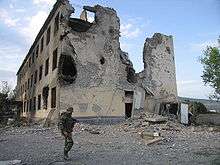Joint Control Commission for Georgian–Ossetian Conflict Resolution
Joint Control Commission for Georgian–Ossetian Conflict Resolution (JCC) is a peacekeeping organization, operating in South Ossetia and overseeing the joint peacekeeping forces in the region.
Created in 1992 after the South Ossetian War, the Commission consisted of four members with equal representation: Georgia, North Ossetia, Russia, and South Ossetia. Georgia declared wish to withdrew from the JCC in March 2008, demanding a new 2+2+2 formula, including the EU, the Organization for Security and Co-operation in Europe (OSCE) and the Provisional Administrative Entity of South Ossetia on the place of North Ossetia.[1] The command of the Georgian peacekeepers was transferred from the JCC to the Georgian Defense Ministry.[2]
The Commission was created by an agreement signed by the Head of Parliament of Georgia, Eduard Shevardnadze, and the President of Russia, Boris Yeltsin.[3] Shevardnadze later succeeded Zviad Gamsakhurdia as the President of Georgia
The Joined Peacekeeping Force (JPKF) created by the agreement consisted of three members with equal representation: Georgian, Russian and South Ossetian contingents. By September, 2008, Georgia left the JKPF.[4]
Joined peacekeeping force (JPKF) in the 2008 South Ossetia war

At 11:00 p.m., August 7, the Georgian army began a massive artillery bombardment on the city of Tskhinvali, starting the Battle of Tskhinvali, the first major battle of the 2008 South Ossetia war. At 11:45 p.m. OSCE monitors reported that shells were falling on Tskhinvali every 15–20 seconds.[5]
According to Gia Karkarashvili, ex-minister of defense of Georgia, Georgian servicemen of the JPKF were ordered by the Georgian command to leave their posts on August 7, at 3:00 p.m. This was one hour before the Georgian army received an order to move to the borders of South Ossetia. Karkarashvili claimed Georgian JPKF servicemen did not take part in the attack on the city they vowed to protect.[6] However, Sergey Lavrov, minister of foreign affairs of Russia, later accused Georgian JPKF servicemen of taking part in the Georgian onslaught, and of "firing at their comrades-in-arms [from JPKF]".[7]
Shortly before midnight of August 7, Mamuka Kurashvili, then a commander of the Georgian JPKF battalion, claimed Georgia started an operation to "reinstate constitutional order", and "cleanse the Georgian territory of criminal elements".[8] Kurashvili took part in the attack on Tskhinvali.[9]
According to Russian government, Russian peacekeeping battalion played a major role in the defense of Tskhinvali during the Georgian onslaught. Russian government reported ten peacekeepers from the Russian JPKF force were killed during the Georgian attacks on the base of Russian JPKF peacekeepers in Tskhinvali.[10] According to Russian government: though vastly outnumbered, 250 Russian peacekeepers present in the cantonment repelled five Georgian attacks, destroyed six tanks, and four armored vehicles of the Georgian army. The peacekeepers were offering resistance for three days, until, on August 10, with Russian army units coming over from Northern Ossetia, Georgian army had to retreat from Tskhinvali. The Georgian army failed to take the cantonment of the Russian peacekeeping battalion.[11]
Konstantin Timerman, acting commander of the Russian JPKF unit, was awarded the Star of Hero of Russia, the highest award in the Russian military, and several servicemen of the unit were awarded the Order of Courage and the Cross of St. George for military heroism.[12][13]
References
- ↑ Civil Georgia. "Civil.Ge - Tbilisi Proposes New Negotiating Format for S.Ossetia". Retrieved 7 September 2015.
- ↑ Russia in Global Affairs, Vol.6 No.4, October–December 2008, http://www.globalaffairs.ru/docs/2008_english4.pdf
- ↑ Sochi agreement, version in Russian language
- ↑ "Кавказский Узел - Гия Каркарашвили (экс-министр обороны Грузии): "Власть оставила на поле боя вооружение, погибших и свою честь"". Кавказский Узел. Retrieved 7 September 2015.
- ↑ Jon Swain (9 November 2008). "Georgia fired first shot, say UK monitors". London: The Sunday Times. Retrieved 2008-11-12.
- ↑ "Кавказский Узел - Гия Каркарашвили (экс-министр обороны Грузии): "Власть оставила на поле боя вооружение, погибших и свою честь"". Кавказский Узел. Retrieved 7 September 2015.
- ↑ "Лавров: Грузинские миротворцы должны покинуть Южную Осетию". Юга.ру. Retrieved 7 September 2015.
- ↑ "Курашвили, Мамука". Retrieved 7 September 2015.
- ↑ Civil Georgia. "Civil.Ge - Senior MoD Official Testifies Before War Commission". Retrieved 7 September 2015.
- ↑ IIFFMCG Vol III, p.371
- ↑
- ↑
- ↑ "Президент России - Указ «О награждении государственными наградами Российской Федерации военнослужащих Вооруженных Сил Российской Федерации»". Retrieved 7 September 2015.